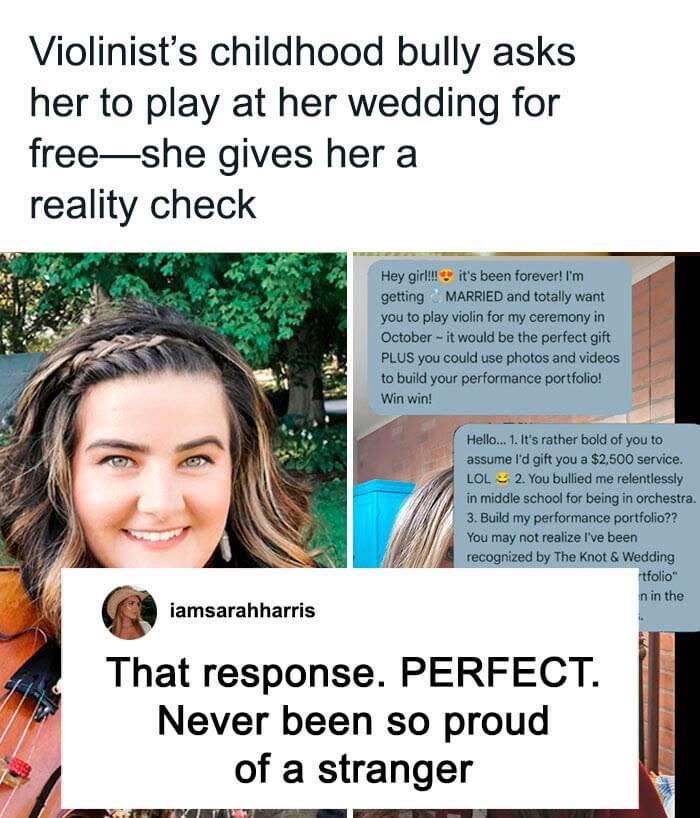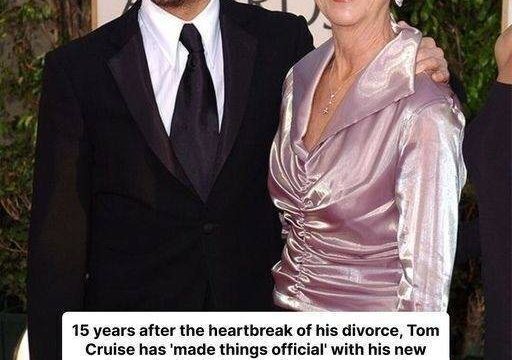Having a unique talent can be an incredible asset, something that brings joy and success over the years. However, for many people, those talents can also lead to being picked on during childhood. This was the case for Tiffany Mulder, a violin prodigy who faced bullying during her middle school years simply because she played in the orchestra.

Tiffany has since gone on to become a renowned violinist, performing at high-profile weddings and events. But one day, her past caught up with her in a way she never expected. The very person who used to bully her reached out with a surprising request: the bully wanted Tiffany to perform at her wedding for free.
The bully contacted Tiffany with a message that dripped with fake friendliness. “Hello there! Long time no see,” the message began. “I’m getting married in October, and I would love for you to play the violin at my ceremony. It would be such a great gift, and you could even use the photos and videos to showcase your talent! A win-win!”
This bully assumed Tiffany would be eager to accept, thinking it was an excellent opportunity for her to expand her portfolio. What she didn’t realize was that Tiffany had long since built a successful career and didn’t need favors from anyone—especially not from someone who had treated her so poorly in the past. In fact, Tiffany had been recognized by prominent wedding platforms like The Knot and Wedding Wire for six consecutive years.
@tiffanymooreviolinPart 1 – Bully Bride
Tiffany’s Perfect Response
Instead of letting old memories stir up negative feelings, Tiffany handled the situation with grace—and a bit of well-earned revenge. She responded to the former bully with a polite but firm message.
“Hi there! It’s pretty bold of you to expect a $2,500 service as a gift,” Tiffany began. “You used to bully me a lot back in middle school for being in the orchestra. And as for building my portfolio, I’ve been acknowledged by The Knot and Wedding Wire for six years straight.”
Tiffany went on to explain that she had been working in the wedding industry since she was just 12 years old. After nearly two decades of hard work, she didn’t need any help expanding her portfolio—least of all from someone who had been so unkind to her in the past.

The Bride’s Reaction
The bride-to-be was not pleased with Tiffany’s response. Instead of apologizing or realizing the gravity of her past actions, she criticized Tiffany’s prices, calling them too high. Yet, despite the criticism, she persisted, continuing to request a discount and even suggesting that they could “become friends” again.
Tiffany, however, was not fooled. She had her doubts about the sincerity of her former bully’s intentions and had no interest in rekindling any kind of friendship. Politely but firmly, she informed the bride that she already had a solid group of friends and had no room in her life for any more negativity.
The Desperate Offer
Still unwilling to take no for an answer, the bride upped the ante. She offered Tiffany $1,000 to perform the slow dance song at her wedding. But Tiffany wasn’t swayed by the offer, and she couldn’t resist injecting a little humor into the situation.
In a playful twist, Tiffany pointed out that the bride was getting married on “Mean Girls Day”—a fitting date, given their shared past. She declined the $1,000 offer and made it clear that she wasn’t interested in working for “exposure,” a common tactic used to underpay artists.
The Final Blow
To drive the point home, Tiffany jokingly suggested that the bride ask her guests to contribute five dollars each as an entertainment fee to help cover the cost of hiring her. Of course, this wasn’t a serious offer, but it was Tiffany’s way of making it clear that she wasn’t going to be taken advantage of.

In the end, Tiffany got her revenge by standing up for herself and refusing to let her former bully use her talent for free. She maintained her professionalism while delivering a clear message: respect the value of someone’s work, and don’t expect favors from those you’ve wronged in the past.
Tiffany’s story is a perfect example of how success can be the best form of revenge. By staying true to herself and recognizing her worth, she was able to rise above the negativity of her past. Her childhood bully, on the other hand, learned the hard way that actions have consequences. In the end, Tiffany’s sweet revenge was more than just saying no—it was about taking pride in her accomplishments and refusing to let anyone take advantage of her hard-earned success.





